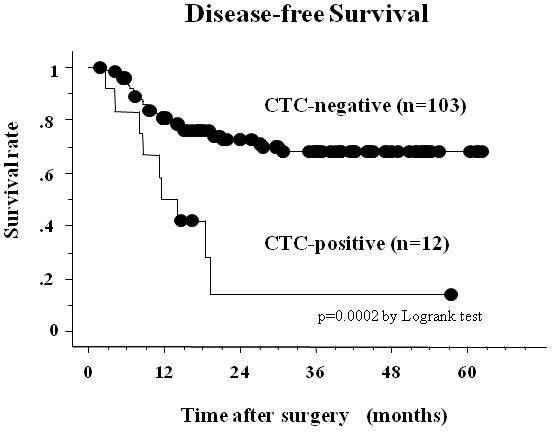Although circulating tumor cells (CTCs) in peripheral blood have recently been reported in patients with various types of cancer, the significance in esophageal cancer remains unknown. This study examined the correlation between prognosis and preoperative CTCs in peripheral blood in esophageal cancer patients who underwent surgery. A total of 115 patients with squamous cell carcinoma of the esophagus (ESCC) underwent curative resection at our hospital between September 2002 and December 2006. Peripheral blood samples were collected immediately before surgery and was subjected to real-time RT-PCR analysis for quantitation of carcinoembryonic antigen (CEA) mRNA and squamous cell carcinoma antigen (SCC) mRNA. Patients who had one or more positive markers as determined by RT-PCR were defined as CTC-positive. Twelve patients (10.4%) were CTC-positive. There were no significant relationship between CTC-positivity and any clinicopathological parameters. Overall survival did not significantly differ between the CTC-positive and CTC-negative patients (p=0.17). However, disease-free survival was significantly better in CTC-negative patients than in CTC-positive patients (p=0.0002). Multivariate analysis identified the number of lymph node metastasis (HR: 2.62, 95%CI: 1.22-5.61, p=0.0137), venous invasion (HR: 3.0009, 95%CI: 1.09-8.33, p=0.0339) and CTC-positivity (HR: 2.50, 95%CI:1.13-5.54, p=0.0237) to be independent prognostic factors. The incidence of distant organ failure was significantly higher in CTC-positive patients than in CTC-negative patients (5/12 vs 15/103, p=0.034), whereas the other types of recurrence did not significantly differ between the two groups. Conclusions: CTCs in preoperative peripheral blood could be a predictive factor for poor prognosis and distant organ metastasis in patients with squamous cell carcinoma of the esophagus who underwent curative resection.
 500 Cummings Center
500 Cummings Center +1 978-927-8330
+1 978-927-8330
 +1 978-524-0461
+1 978-524-0461